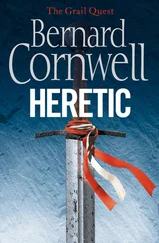‘I know,’ Eleanor said firmly, and she did know for she had been in Caen when the English archers, disobeying their King, had swarmed across the bridge and laid the town waste.
‘If we don’t fight them and stop them here,’ Thomas said, ‘then their horsemen will hunt us all down. One after the other.’
‘You said you would marry me,’ Eleanor declared, crying again. ‘I don’t want my baby to be fatherless, I don’t want it to be like me.’ She meant illegitimate.
‘I will marry you, I promise. When the battle is done we shall be married in Durham. In the cathedral, yes?’ He smiled at her. ‘We can be married in the cathedral.’
Eleanor was pleased with the promise, but too furious to show her pleasure. ‘We should go to the cathedral now,’ she snapped. ‘We would be safe there. We should pray at the high altar.’
‘You can go to the city,’ Thomas said. ‘Let me fight my King’s enemies and you go to the city, you and Father Hobbe, and you find the old monk and you can both talk to him, and afterwards you can go to the cathedral and wait for me there.’ He unstrapped one of the big sacks on the mare’s back and took out his haubergeon, which he hauled over his head. The leather lining felt stiff and cold, and smelt of mould. He forced his hands down the sleeves, then strapped the sword belt about his waist and hung the weapon on his right side. ‘Go to the city,’ he told Eleanor, ‘and talk to the monk.’
Eleanor was crying. ‘You are going to die,’ she said, ‘I dreamed it.’
‘I can’t go to the city,’ Father Hobbe protested.
‘You’re a priest,’ Thomas barked, ‘not a soldier! Take Eleanor to Durham. Find Brother Collimore and talk to him.’ The prior had insisted that Thomas wait and suddenly it seemed very sensible to send Father Hobbe to talk to the old monk before the prior poisoned his memories. ‘Both of you,’ Thomas insisted, ‘talk to Brother Collimore. You know what to ask him. And I shall see you there this evening, in the cathedral.’ He took his sallet, with its broad rim to deflect the downward stroke of a blade, and tied it onto his head. He was angry with Eleanor because he sensed she was right. The imminent battle was not his concern except that fighting was his trade and England his country. ‘I will not die,’ he told Eleanor with an obstinate irrationality, ‘and you will see me tonight.’ He tossed the horse’s reins to Father Hobbe. ‘Keep Eleanor safe,’ he told the priest. ‘The Scarecrow won’t risk anything inside the monastery or in the cathedral.’
He wanted to kiss Eleanor goodbye, but she was angry with him and he was angry with her and so he took his bow and his arrow bag and walked away. She said nothing for, like Thomas, she was too proud to back away from the quarrel. Besides, she knew she was right. This clash with the Scots was not Thomas’s fight, whereas the Grail was his duty. Father Hobbe, caught between their obstinacy, walked in silence, but did note that Eleanor turned more than once, evidently hoping to catch Thomas looking back, but all she saw was her lover climbing the path with the great bow across his shoulder.
It was a huge bow, taller than most men and as thick about its belly as an archer’s wrist. It was made from yew; Thomas was fairly sure it was Italian yew though he could never be certain because the raw stave had drifted ashore from a wrecked ship. He had shaped the stave, leaving the centre thick, and he had steamed the tips to curve them against the way the bow would bend when it was drawn. He had painted the bow black, using wax, oil and soot, then tipped the two ends of the stave with pieces of nocked antler horn to hold the cord. The stave had been cut so that at the belly of the bow, where it faced Thomas when he drew the hempen string, there was hard heartwood which was compressed when the arrow was hauled back while the outer belly was springy sapwood and when he released the cord the heartwood snapped out of its compression and the sapwood pulled it back into shape and between them they sent the arrow hissing with savage force. The belly of the bow, where his left hand gripped the yew, was whipped with hemp and above the hemp, which had been stiffened with hoof glue, he had nailed a scrap of silver cut from a crushed Mass vessel that his father had used in Hookton church, and the piece of silver cup showed the yale with the Grail in its clawed grip. The yale came from Thomas’s family’s coat of arms, though he had not known that when he grew up for his father had never told him the tale. He had never told Thomas he was a Vexille from a family that had been lords of the Cathar heretics, a family that had been burned out of their home in southern France and which had fled to hide themselves in the darkest corners of Christendom.
Thomas knew little of the Cathar heresy. He knew his bow and he knew how to select an arrow of slender ash or birch or hornbeam, and he knew how to fledge the shaft with goose feathers and how to tip it with steel. He knew all that, yet he did not know how to drive that arrow through shield, mail and flesh. That was instinct, something he had practised since childhood; practised till his string fingers were bleeding; practised until he no longer thought when he drew the string back to his ear; practised until, like all archers, he was broad across the chest and hugely muscled in his arms. He did not need to know how to use a bow, it was just an instinct like breathing or waking or fighting.
He turned when he reached a stand of hornbeams that guarded the upper path like a rampart. Eleanor was walking stubbornly away and Thomas had an urge to shout to her, but knew she was already too far off and would not hear him. He had quarrelled with her before; men and women, it seemed to Thomas, spent half their lives fighting and half loving and the intensity of the first fed the passion of the second, and he almost smiled for he recognized Eleanor’s stubbornness and he even liked it; and then he turned and walked through the trampled drifts of fallen hornbeam leaves along the path between stone-walled pastures where hundreds of saddled stallions were grazing. These were the warhorses of the English knights and men-at-arms and their presence in the pastures told Thomas that the English expected the Scots to attack because a knight was far better able to defend himself on foot. The horses were kept saddled so that the mailed men-at-arms could either retreat swiftly or else mount up and pursue a beaten enemy.
Thomas could still not see the Scottish army, but he could hear their chanting, which was given force by the hellish beat of the big drums. The sound was making some of the pastured stallions nervous and three of them, pursued by pageboys, galloped beside the stone wall with their eyes showing white. More pages were exercising destriers just behind the English line, which was divided into three battles. Each battle had a knot of horsemen at the centre of its rear rank, the mounted men being the commanders beneath their bright banners, while in front of them were four or five rows of men-at-arms carrying swords, axes, spears and shields, and ahead of the men-at-arms, and crowded thick in the spaces between the three battles, were the archers.
The Scots, two arrow shots away from the English, were on slightly higher ground and also divided into three divisions which, like the English battles, were arrayed beneath their clusters of commanders’ banners. The tallest flag, the red and yellow royal standard, was in the centre. The Scottish knights and men-at-arms, like the English, were on foot, but each of their sheltrons was much larger than its opposing English battle, three or four times larger, but Thomas, tall enough to look over the English line, could see there were not many archers in the enemy ranks. Here and there along the Scottish line he could see some long bowstaves and there were a few crossbows visible among the thicket of pikes, but there were not nearly so many bowmen as were in the English array, though the English, in turn, were hugely outnumbered by the Scottish army. So the battle, if it ever started, would be between arrows and Scottish pikes and men-at-arms, and if there were not enough arrows then the ridge must become an English graveyard.
Читать дальше












